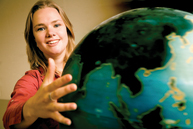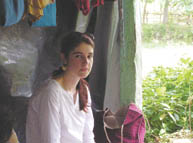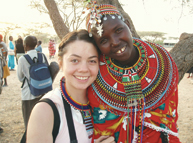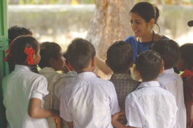Far and away
Internships, field studies and international exchanges are a growing incentive for students to stray off campus in order to find themselves

Economics and IDS student Katrina Harris got to know the real Kenya during her three-month internship
Claudio Calligaris
At McGill, the world is within every student's reach. On any given day, there are international club events to take part in, visiting professor lectures to attend and, if you're really lucky, a samosa sale in full swing in the halls of Leacock. But beyond the hubbub of the university's diverse campus, students have the unique opportunity to face a whole other landscape: reality. How? Taking their studies to the real world, whether it be downtown Montreal or rural Kenya.
Once seen as a fun, enriching way to spend a semester, undergraduate research opportunities are now considered essential to the internationalization of education. Last November, Provost Anthony Masi emphasized the importance of student mobility in Strengths & Aspirations, a white paper call to action about the university's future goals. His words mirrored a wider trend of globally minded institutions striving to ensure a real-world awareness that is, as Princeton president Shirley Tilghman put it, "built into the DNA" of universities.
At McGill, there are three ways to infuse the academic routine with worldly flavour. The Student Exchange and Study Abroad (SESA) office is partnered with over 80 universities worldwide where students can spend a semester or two earning credits toward their degree while paying McGill tuition. The Field Studies program allows students to gain practical experience in environmental and social issues in East Africa, Barbados or Panama under the supervision of McGill instructors. And since 2003, the Arts Internship Office enables students to earn academic credit by working with a company or organization, even in Canada, whose mandate reflects their area of study.
"The ultimate goal," says internship officer Anne Turner, "is that every student have one research experience during their academic career."
McGill recently took a huge step in that direction by establishing the Undergraduate Research Experience Fund. Boasting over 650 research options, the fund will ensure that students profit from the greatest possible range of international study and research opportunities during their undergraduate years in preparation for their future roles as community leaders. Not only will this initiative bolster McGill's position as one of Canada's most competitive, forward-looking academic institutions, it will also foster dialogue between undergraduates, their professors, the public and the donors that make the research experiences possible.


Left: Marie-Eve Reny leaves her mark on an Indian
branch of UNICEF, where she interned as part of her masters degree in
political science. Right: Political science student Dominique Rouleau with
her new Samburu friend in Northern Kenya's Indigenous Information
Network.
PHOTOS COURTESY OF THE ARTS INTERNSHIP
OFFICE
Go away = grow up
Classroom lectures provide an invaluable context for studying real world issues. Yet an international experience can infuse life into words like "poverty," "disease" and "injustice" in ways no amount of reading can accomplish. Internship work jump-starts students' confidence because it requires quick, independent thinking and a strong sense of resourcefulness. Field studies and exchanges force students to rapidly adapt to a foreign routine, thus building self-sufficiency.
"When students come back they are rarely the same," says anthropology professor John Galaty, who has witnessed students grow and thrive during field study experiences in Kenya.
Nathan Morrell, a U3 Political Science and International Development Studies student, is definitely more self-assured as a result of his time away.
"When I arrived in Nairobi, I was welcomed with open arms by the Kenya Human Rights Commission staff members, who placed a surprising — and initially intimidating — degree of trust in my abilities," he confesses. "I was immediately given the task of researching and writing two Quarterly Human Rights Reports, which outlined changes and concerns regarding many Kenyan human rights issues like workers' rights, official corruption and police brutality. As a result, I am more confident about what I can achieve when I am given the space to work independently."
Because students are expected to share their experiences through articles and public forums upon their return, competitiveness gives way to a sense of camaraderie. Alumna Sehr Athar couldn't wait to get back to her arts seminars to impart her insights, so she shared her cross-cultural exchange online at http://sehrbangla.blogspot.com from her host home in Bangladesh.
"Given that I was more or less alone I deciaded to express my thoughts through an online journal," says the international development studies and political science graduate. "My blog allowed me to be the most honest I've ever been. It afforded me the opportunity to truly analyze my experience and have my peers' support throughout my time abroad."
Time away from McGill also helps students orient themselves towards future careers on the job market and in graduate school, two areas that are increasingly recognizing, if not requiring, university work experience.
"My future career path has definitely acquired a new flavour," admits microbiology and immunology PhD candidate Lina Kalfayan, who won the Canada Corps Program and Forces Avenir Award for her work on HIV vaccines and novel immune monitoring tools in India. "I can look beyond a postdoctoral fellowship, beyond an academic or industrial position… and definitely beyond my laboratory bench!"
Little steps, big results

Lina Kalfayan, a microbiology and immunology PhD student and Forces Avenir award recipient, wins over her audience during an internship in India.
PHOTO COURTESY OF THE ARTS INTERNSHIP OFFICE
Beyond student growth, research experiences are instrumental to the development of McGill's relationships with NGOs, policymakers and other learning institutions.
"Students are the best ambassadors for the university," asserts Philip Oxhorn, political science professor and director of the McGill Centre for Developing Area Studies. "[Host organizations] are grateful to McGill because students do such great work for them — they make a difference even if they don't realize it."
Thanks to the commitment and ingenuity of McGill's student interns and research assistants, the university maintains important ties with outside organizations and attracts the attention of topnotch donors.
"I feel it's important to touch as many people as you can with gifts and donations," says university donor David Roland, the chief executive officer of the independent Canadian investment dealer Paradigm Capital Inc. "By choosing to fund McGill internships I can directly benefit students and all the people they have an impact on."
Some host organizations have come to see McGill's involvement as crucial to their growth. Chris Bradley, program coordinator at Equitas, a leader in human rights education, considers himself very fortunate to have McGill interns working with him.
"Student interns are essential to the success of our human rights training program," he says, highlighting the many ways in which students provide logistical and communications support. "The experience is definitely mutually beneficial."
With so many benefits to students, host organizations and the university at large, it's safe to say internships, field studies and exchanges are here to stay. Looks like student bookcases everywhere will have to make a little extra room for a briefcase, some luggage, and a handful of framed memories.
Improving a home away from home
A sense of initiative and compassion helped KATRINA HARRIS enhance standards of living in West Kenya
It's not always easy to understand the real-life challenges of development projects through textbooks and lectures. With McGill's internship program, I was given the opportunity to study first-hand the impact of microcredit and microfinance programs on rural communities in West Kenya.
During my three months abroad, I worked with Africa Now, the Kenya Rural Enterprise Program (K-Rep) and Honey Care Africa, three organizations committed to providing micro enterprise development programs ranging from low-cost housing projects to health care financing in rural areas that are not serviced by commercial banks. Most of my time was spent doing field work in some of Kenya's poorest, most disease-prone cities. I travelled by motorbike to visit remote farmers, offer suggestions for increased crop production, check the health of livestock and deliver new harvest seeds. I also helped improve school-based sanitation by organising surveys and checking water tanks in selected at-risk villages that lacked clear, accessible water supplies.
Through this hands-on learning experience, I witnessed a glaring lack of data collection and baseline studies. How, I wondered, did the NGOs in this area know that their assistance was meeting its goals to increase standards of living? Since my NGO co-workers were not as familiar with computers and were busy with fieldwork, I began to draft baseline surveys, standard-of-living indicators and project evaluation proposals. Teaming up with the Tropical Institute of Community Health, I wrote a proposal advocating a province-wide comprehensive data collection system aimed at gathering holistic health information.
Following my NGO work, I spent three months living with a traditional, lower class family of six who helped me get to know the real Kenya. Catching the informal Matatu minibus, preparing and eating ugali, Kenya's staple meal of maize flour and water, taking bucket baths and talking till dawn about everything and anything in broken Kiswahili were invaluable experiences. More challenging than the internship itself, living on my own in a foreign home and culture taught me the importance of open-mindedness and flexibility.
U3 Economics and International Development Studies, BA '06
Fashioning new perspectives on art
After interning at a hip fashion magazine, SARA CHARLTON discovered the power of visual culture
Two years ago I began my art history internship at Loulou Magazine, leaving academic writing at the bright pink office door of Canada's newest fashion magazine. Entering into the world of excessive alliteration, playful puns and girlish tones was a breath of fresh air. But make no mistake, it wasn't all cheeky chitchat: the magazine was — and still is — serious about being cheery. Hours of bouncing blurb ideas back and forth between coworkers taught me how important it is to applaud the creativity of others and to accept suggestions without feeling slighted.
For the first five months, I spent my three days a week at Loulou cataloguing all the beauty products, titles, leads and boutiques used in the magazine since its premiere issue back in 2004. Soon after I started taking on odd jobs like researching films, fact-checking boutique information and brainstorming headlines and leads. While I quickly learnt to come up with quirky phrases to describe a saucy pair of stilettos, I found editing extremely difficult. But working as part of Loulou's creative team helped me work on my weaknesses and improve my strengths.
Beyond my new editing skills, my days at the magazine gave me a new perspective on the visual culture I studied in my art history classes. I started to see all art as advertising: it was no longer a way of merely understanding the past, but also of altering the direction of the future through the promotion of specific goods, ideals and morals. My internship made me really appreciate the power of visual culture. Because of my internship experience, I now know that I want to continue working in magazines in order to better harness that power and inspire my fellow magazine lovers in a creative and conscientious way.
Fortunately, my short career as a "word nerd" intern at Loulou has led to a permanent position as editorial assistant. I now have more creative control, more opportunities to learn new skills and, last but not least, more free beauty product samples to choose from!
U3 Art History and English Literature, BA '06
Filling in the research gaps
Three months in Ghana was enough to steer ANDREW BAUER toward graduate studies in economics
From day one of my internship in Accra, Ghana, I was given assignments I felt totally unqualified for. Working with the Commission on Human Rights and Administrative Justice, Ghana's national human rights institution, I created a training program for anti-corruption investigators, supervised the annual Ghana Prisons Report, compiled a report on the annual management retreat and contributed to the Commission's newsletter.
Though the work was interesting, I learned a lot more simply hanging around the office, chatting with the African civil service staff. I grew to understand the civil service's main problems: a surplus of unqualified employees, poor infrastructure (there was a ratio of one computer to every three or four people) and high morbidity — most of the Commission's staff missed six to eight weeks a year due to malaria, cholera, typhoid or HIV/AIDS.
I realized that while academia can provide a very important framework for analyzing problems and seeing things for what they really are, there is no substitute for real-life experience. How can you understand the real world unless you've lived in it? How can you study, say, African political science, without speaking to African politicians, members of the African civil society or Africans themselves? If you don't, you're just taking an author's word for what's going on in the world instead of experiencing it yourself.
That said, it's not much use doing an internship with your eyes closed, simply completing your assigned work without discovering the wider world around you. You can go all the way to Timbuktu to do an internship, but you won't learn much if you stay in your air-conditioned space while salt caravans are coming into the port just behind your office.
Going to Africa — three times now, first to Kenya and now to West Africa — and working in both the public and NGO sectors has really stirred my interest. I find the cultures fascinating and incredibly welcoming. Thanks to my internship, my fascination with Africa now has more to do with the economics of the place. Is Africa really stuck in a poverty trap? Are there solutions and, if so, should the West get involved or take a hands-off approach? What I do know is that, in some way or another, I'll be working in Africa or with African institutions for the rest of my life.
U3 Economics and International Development Studies, BA '06

